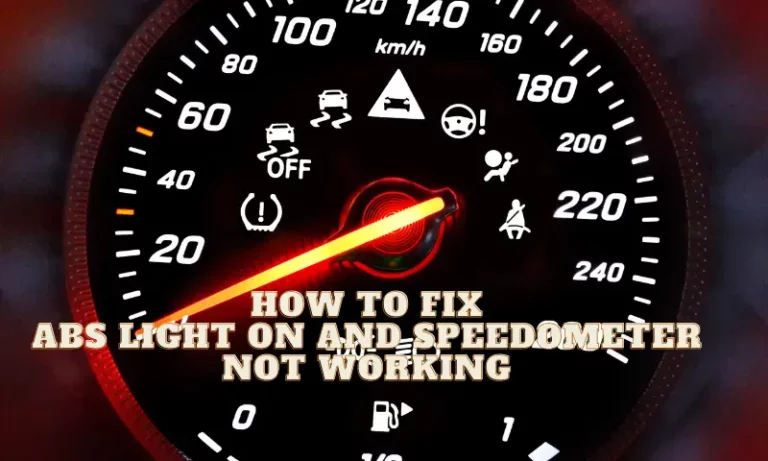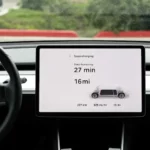Experiencing the ABS light on and speedometer not working can be annoying and potentially dangerous. If the speedometer is functionless, you’ll be unable to gauge your speed accurately. This situation also means you won’t know whether your vehicle’s anti-lock braking system works correctly.
Our guide below has discussed various possible ways to fix this problem. You’ll also find answers to some burning questions in our FAQ section.
Possible Solution #1: Replace a Malfunction ABS Sensor
A malfunctioning ABS sensor is one of the most common triggers of the ABS light on and speedometer not working. You’ll find the wheel speed sensor on each wheel hub or rotor on a 4-channel ABS. You can also find the sensor in the rear differential in some rear-wheel-drive (RWD) applications. The sensors monitor the wheel rotation and send this information (signal) to the car’s ABS control module.
The module uses the signals to keep your wheels from locking up when you apply brakes. If one of these sensors malfunctions, the ABS light will turn on. That is to indicate that the ABS isn’t working correctly. This condition can affect other systems, such as traction and cruise control and sometimes cause the speedometer to stop working.
To fix the problem, you need to replace the faulty sensor. ABS sensor replacement is straightforward and takes an experienced hand with the necessary tools between 30 and 60 minutes. Sometimes, it could be dirt that has clogged the sensor, and a simple clean-up is all it needs. A specialist can tell the difference and perform the repairs accordingly.
Possible Solution #2: Fix Wiring Issues
The wiring connecting the speed sensor (in the transmission or differential) to the electronic control unit or the speedometer gauge may be faulty. That compromises signal transmission. Similarly, the wiring from the ABS sensor to the ABS control module can also become damaged due to corrosion and age. If that happens, there is no signal transmission, and the ABS light will illuminate the dashboard.
Also, wires can short or fuses blow out. You’ll rarely encounter a wiring problem simultaneously within the ABS and speedometer. However, a problem in one system can affect the functioning of the other. For example, a wiring issue within the ABS will likely jeopardize your speedometer gauge.
You need to identify any wiring faults and fix them. If there’s a blown fuse, you must replace it to fix the error.
Possible Solution #3: Fix a Computer Malfunction
Your engine control module (ECM) serves as the engine’s brain. It monitors and controls several engine activities, including the speed. If the ECM malfunctions, the speedometer will behave erratically or stop working.
The ECM also affect the functioning of the ABS. If the ECM is faulty, the ABS light may illuminate due to inaccurate signals or miscommunication between the systems. Resetting the ECU can fix the problem if it’s a software concern. You can do that by removing the battery’s negative terminal for at least 15 minutes.
Sometimes the reset won’t work, and the ECU may require a replacement. Leave this task to a qualified technician.
Possible Solution #4: Faulty ABS Module
A faulty ABS module will cause the ABS light to come on. The module controls the ABS; if it fails, the system will also malfunction. As mentioned, that may affect the speedometer as well in some instances.
Fixing a failed ABS module requires the knowledge and experience of a professional. The specialist will need to make an accurate diagnosis and then repair it.
Possible Solution #5: Low Brake Fluid
The ABS may malfunction if the brake fluid level is too low, and turn the warning light on to notify you of the fault. The ABS depends on the brake fluid to function, which means the low fluid levels will compromise its proper functioning. The solution is to top up the fluid brake. That is one of the most straightforward DIY car maintenances.
Open the hood and locate the brake fluid reservoir. You’ll usually find it on the master cylinder, in one of the corners of the engine compartment. Open the reservoir cap and slowly pour the fluid with the help of a funnel. Ensure the fluid level sits near the high marking.
Replace the cap, close the hood and drive the car around to see whether the brakes work well and the light disappears. If the ABS was the cause of the speedometer not reading, adding the fluid should resolve the problem as well.
Possible Solution #6: Replace Worn out Brake Pads/Rotors
The ABS light illuminates if your braking system has an issue, such as worn rotors or brake pads. The ABS keeps track of the brake system; if there’s a problem, the ABS light will turn on.
So, ensure your brakes are in good condition. As we all know, driving with any of these parts damaged can be dangerous. It can increase your stopping distance and the chance of an accident.
FAQs
How Can You Accurately Diagnose a Problem in Your Car?
To accurately diagnose a problem in your car and apply the right solution, get yourself a bi-directional scanner. The tool will check which error codes appear anytime a warning light turns on. For example, the DTC codes can give you a better idea of the component causing the ABS light to come on or the speedometer to fail.
How Much Does Fixing a Speedometer Cost?
Fixing a speedometer can cost anywhere between $100 and $400, depending on the extent of the damage, your car model, and your location. Basic repairs (such as fixing a wiring problem) will cost roughly $100. On average, you can pay about $250.
Conclusion
As discussed, the problem can result from various issues, ranging from faulty sensors to low brake fluid levels. We have learned that an issue affecting the ABS may also be the one to blame for your speedometer malfunctioning.
A good DTC Code scanner can help you diagnose accurately and quickly fix issues. Always seek the help of a reliable mechanic if you find DIY repair challenging.



